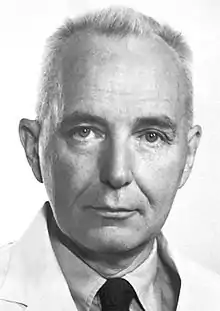Charles Brenton Huggins
Charles Brenton Huggins (September 22, 1901 – January 12, 1997) was a Canadian-American physician, physiologist and cancer researcher at the University of Chicago specializing in prostate cancer.[1] He was awarded the 1966 Nobel Prize for Physiology or Medicine for discovering in 1941 that hormones could be used to control the spread of some cancers.[2] This was the first discovery that showed that cancer could be controlled by chemicals.
Charles Brenton Huggins | |
|---|---|
 Huggins in 1966 | |
| Born | September 22, 1901 Halifax, Nova Scotia, Canada |
| Died | January 12, 1997 (aged 95) Chicago, Illinois, U.S. |
| Citizenship | Canadian, American |
| Alma mater | Acadia University Harvard University |
| Known for | prostate cancer hormones |
| Awards | Nobel Prize for Physiology or Medicine (1966) Cameron Prize for Therapeutics of the University of Edinburgh (1956) Gairdner Foundation International Award (1966) |
| Scientific career | |
| Fields | physiology |
| Institutions | University of Michigan, University of Chicago |
Biography
Huggins was born in Halifax, Nova Scotia, Canada. He graduated from Acadia University with a BA degree in 1920. He went on to study medicine at Harvard Medical School and received his MD degree in 1924. He served his internship and residency in general surgery with Frederick A. Coller at the University of Michigan.[3]
Huggins established a method to measure the effect hormone changes have on prostatic function. He found out that castration or estrogen administration led to glandular atrophy, which could be reversed by re-administration of androgen. In 1941 the beneficial effect of androgen ablation on metastatic prostate cancer was realised when Huggins and Clarence Hodges treated patients by either castration or estrogen therapy. They monitored the prostate size and therapeutic efficacy by measuring serum prostatic acid phosphatase levels and concluded that androgenic activity in the body influences prostate cancer, at least with respect to serum phosphatase. Huggins was the first to use a systemic approach to treat prostate cancer.
Huggins was elected to the United States National Academy of Sciences and the American Academy of Arts and Sciences in 1949.[4][5] In 1958, Huggins received the Cameron Prize for Therapeutics of the University of Edinburgh. In 1962, he was elected to the American Philosophical Society.[6] He was awarded the Nobel Prize in Physiology or Medicine on October 13, 1966.[7]
Huggins died on January 12, 1997, in Chicago, Illinois, aged 95. His wife died in 1983.
Notes
- Altman, Lawrence K. (January 15, 1997), "C. B. Huggins Dies at 95; Won Nobel for Cancer Work", The New York Times, retrieved October 13, 2017
- Huggins C, Hodges CV (2002). "Studies on prostatic cancer. I. The effect of castration, of estrogen and of androgen injection on serum phosphatases in metastatic carcinoma of the prostate. 1941". The Journal of Urology. 167 (2): 948–951. doi:10.1097/00005392-200207000-00004. PMID 11905923.
- "Charles B. Huggins, MD, 1901–1997". University of Chicago Medicine 1997 Press Releases. University of Chicago. Archived from the original on 21 June 2010. Retrieved 8 September 2015.
- "Charles B. Huggins". www.nasonline.org. Retrieved 2022-11-15.
- "Charles Brenton Huggins". American Academy of Arts & Sciences. Retrieved 2022-11-15.
- "APS Member History". search.amphilsoc.org. Retrieved 2022-11-15.
- Denmeade, SR; Isaacs, JT (May 2002). "A history of prostate cancer treatment". Nature Reviews. Cancer. 2 (5): 389–96. doi:10.1038/nrc801. PMC 4124639. PMID 12044015.
References
- Toledo-Pereyra, L H (2001). "Discovery in surgical investigation: the essence of Charles Brenton Huggins". Journal of Investigative Surgery. 14 (5): 251–2. doi:10.1080/089419301753170011. PMID 11700917. S2CID 13022445.
- Forster, R E (June 1999). "Charles Brenton Huggins (22 September 1901–12 January 1997)". Proceedings of the American Philosophical Society. 143 (2): 325–31. PMID 11623829.
- Raju, T N (August 1999). "The Nobel chronicles. 1966: Francis Peyton Rous (1879–1970) and Charles Brenton Huggins (1901–97)". Lancet. 354 (9177): 520. doi:10.1016/S0140-6736(05)75563-X. PMID 10465213. S2CID 53300407.
- Schmähl, D (1980). "[Charles Brenton Huggins, Nobel Prize for Medicine 1966: "Discovery is our business"]". Chirurgisches Forum für experimentelle und klinische Forschung: VI–VIII. PMID 6993114.
- Drucker, W R (1973). "Charles B. Huggins, MD, FACS (hon)". Surgical Forum. 24: V. PMID 4618632.
- "Classics in oncology. Charles Brenton Huggins". CA: A Cancer Journal for Clinicians. 22 (4): 230–1. 1972. doi:10.3322/canjclin.22.4.230. PMID 4625048. S2CID 221547609.
- Kenéz, J (October 1971). "[Ch. B. Huggins at the age of 70]". Orvosi Hetilap. 112 (42): 2535–7. PMID 4943846.
- Morii, S (May 1971). "[My professor, Dr. Huggins]". Hinyokika Kiyo. Acta Urologica Japonica. 17 (5): 295–6. PMID 4933515.
- Fukunishi, R (October 1967). "[Pioneer of cancer research: Dr. Charles B. Huggins]". Nippon Rinsho. 25 (8): 1709–12. PMID 4868962.
- Schmähl, D (December 1966). "[Charles Brenton Huggins]". Dtsch. Med. Wochenschr. 91 (51): 2308–9. PMID 5333371.
- Frenkel, M (November 1966). "[Charles Brenton Huggins, co-winner of the Nobel Prize in physiology and medicine, 1966]". Nederlands Tijdschrift voor Geneeskunde. 110 (45): 1994–5. PMID 5342106.
- Luft, R (November 1966). "[Nobel prize in physiology and medicine 1966. Charles Brenton Huggins]". Nordisk Medicin. 76 (44): 1269–71. PMID 5337055.
- Franksson, C (October 1966). "[Nobel Prize of the year. II. Charles B. Huggins]". Läkartidningen. 63 (43): 4102–4. PMID 5343069.
- TALALAY, P (June 1965). "The Scientific Contributions Of Charles Brenton Huggins". JAMA. 192 (13): 1137–40. doi:10.1001/jama.1965.03080260025007. PMID 14301033.
External links
- Charles B. Huggins on Nobelprize.org
- Prostate Cancer
- Ben May Department for Cancer Research